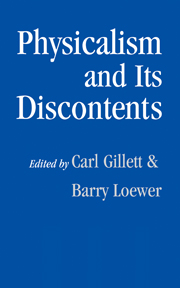Book contents
- Frontmatter
- Contents
- Contributors
- Preface
- Part I Physicalism
- Part II Physicalist Discontents
- 9 The Roots of Reductionism
- 10 The Significance of Emergence
- 11 The Methodological Role of Physicalism: A Minimal Skepticism
- 12 Physicalism, Empiricism, and Positivism
- Part III Physicalism and Consciousness: A Continuing Dialectic
- References
- Index
12 - Physicalism, Empiricism, and Positivism
Published online by Cambridge University Press: 02 November 2009
- Frontmatter
- Contents
- Contributors
- Preface
- Part I Physicalism
- Part II Physicalist Discontents
- 9 The Roots of Reductionism
- 10 The Significance of Emergence
- 11 The Methodological Role of Physicalism: A Minimal Skepticism
- 12 Physicalism, Empiricism, and Positivism
- Part III Physicalism and Consciousness: A Continuing Dialectic
- References
- Index
Summary
The word physicalism, when introduced into philosophical conversation by Neurath and Carnap, seemed theirs to define, much as a century earlier the word positivism had been Comte's to define. Not everyone is so lucky as to introduce a label by which they will later become known, and such was the lot of Locke who has been tossed with Hobbes and Hume into the catchall bin of Empiricism. Whether original with Locke or presaged in Leviathan, the idea that Ideas were all the mind could contemplate seems distinctive enough to deserve its own ‘ism.’ In any event, the marriage of Locke's internal Empiricism with Comte's cold Positivism produced the uneasy union that the Vienna Circle styled ‘physicalism,’ but that the world has since come to call by turns ‘Logical Positivism’ and ‘Logical Empiricism.’ That a philosophical position could be defined by conjoining two seemingly mismatched themes would itself be of at least historical interest. But it gains a more topical interest if we could show how antiphysicalist theses more recently bandied about were born of the same unhappy union. To that end we will begin in the middle.
Consistent with their antimetaphysical approach to philosophy, Neurath and Carnap cast their original definition of physicalism in linguistic terms. Roughly, physicalism was the name they gave to the thesis that every meaningful sentence, whether true or false, could be translated into physical language. Although both thought the thesis obviously true, neither thought it knowable a priori.
- Type
- Chapter
- Information
- Physicalism and its Discontents , pp. 251 - 268Publisher: Cambridge University PressPrint publication year: 2001
- 3
- Cited by



